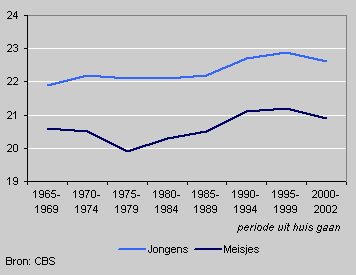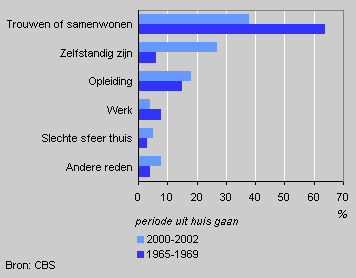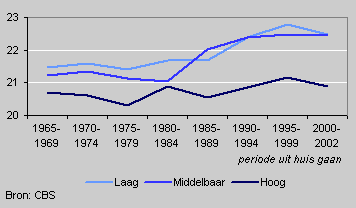Young people leave home earlier

The age at which young people leave their parental home is decreasing again. In the eighties and nineties young people stayed with their parents for longer and longer, but at the beginning of this century the average age at which they left home started to fall again
Average age at leaving home

Girls leave the nest earlier
Nearly a quarter of a million young people leave home every year. Some leave before their eighteenth birthday; most after their twentieth. Girls leave home on average two years earlier than boys.
On their own two legs
At the beginning of the eighties, girls left home at the age of 20.3 years on average. At the end of the nineties this was one year later. Boys, too, stayed with their parents for longer in this period. Smaller families and larger houses made it more attractive for children to stay home longer. Greater tolerance by parents for their children, and vice versa, also played a role.
The average age at leaving home did not rise further at the beginning of this century; on the contrary it fell slightly. Low unemployment among young people in the beginning of this century may be an explanation for this.
Reasons for leaving home

More often alone
There has been a shift in reasons for leaving homer in the last four decades. At the end of the sixties, two-thirds of young people left home to live together or to marry. In 2000-2002 only four out of ten young people left home for this reason.
Independence was the main reason to leave home for one quarter of young people in 2000-2002. At the end of the sixties only 5 percent of home leavers gave this reason. This shift is connected with the process of individualisation in society. More and more young adults feel the need to live on their own for a time after leaving their parents.
Average age at leaving home by education level

In digs
Young people with a higher education leave home at a younger age on average, often because vocational colleges and universities are not in the neighbourhood of their parental homes. Young people with lower education stay with their parents the longest.
In the second half of the nineties in particular young adults with a lower educational level stayed with their parents for longer. More and more of them left their parents to live alone. The financial possibilities for leaving home at a young age were often not ideal for this group, which may be one of the reasons they left home later.
Arie de Graaf